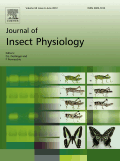
JOURNAL OF INSECT PHYSIOLOGY
Scope & Guideline
Unveiling the Secrets of Insect Biology
Introduction
Aims and Scopes
- Insect Physiology and Biochemistry:
Research on the physiological mechanisms and biochemical pathways that sustain insect life, including metabolism, growth, reproduction, and stress responses. - Ecophysiology:
Studies on how insects interact with their environment, including responses to climate change, habitat alterations, and resource availability. - Neurophysiology:
Investigations into the nervous system function of insects, encompassing behavior, sensory processing, and neurochemical regulation. - Developmental Physiology:
Exploration of the physiological changes during various life stages of insects, including metamorphosis and diapause. - Molecular Physiology:
Focus on the molecular mechanisms underlying physiological processes, employing techniques such as gene editing and transcriptomics. - Insect-Host Interactions:
Research on the physiological aspects of interactions between insects and their hosts, including parasitism, mutualism, and predation. - Environmental Physiology:
Examination of how insects adapt physiologically to environmental stressors such as temperature extremes, humidity fluctuations, and pollutants.
Trending and Emerging
- Climate Change Impacts:
Research on how climate change affects insect physiology, behavior, and ecology is increasingly prominent, addressing the urgent need to understand insect responses to global warming. - Microbiome and Insect Health:
Studies exploring the role of microbiota in insect physiology and health are emerging, highlighting the significance of gut microbes in metabolic processes and disease resistance. - Genetic and Genomic Approaches:
There is a noticeable trend towards utilizing genetic and genomic tools, such as CRISPR/Cas9, to study physiological processes, reflecting advancements in molecular biology. - Physiological Mechanisms of Insect-Pathogen Interactions:
Research focused on how insects respond physiologically to pathogens and parasites is gaining traction, aiming to improve pest management strategies. - Behavioral Physiology:
Increased interest in the physiological basis of insect behavior, including foraging, mating, and social interactions, is evident, bridging the gap between physiology and ethology. - Sustainable Insect Management:
Research addressing the physiological aspects of pest management strategies that are environmentally sustainable and that consider insect welfare is on the rise.
Declining or Waning
- Traditional Toxicology Studies:
Research centered on the toxicological effects of chemicals on insects has seen a decline, possibly due to increasing interest in integrated pest management and sustainable practices. - Static Taxonomic Studies:
Papers focused solely on the classification and description of new insect species without physiological context are less common, as the field moves towards more integrative approaches. - Basic Morphological Studies:
Research that primarily investigates the morphology of insects without linking it to physiological or ecological implications is becoming less prevalent as the emphasis shifts to functional morphology. - Historical Physiology:
Studies that explore historical aspects of insect physiology, such as evolutionary perspectives without direct experimental data, are diminishing in favor of more contemporary research approaches.
Similar Journals

Frontiers in Physiology
Fostering collaboration in the realm of physiology.Frontiers in Physiology, published by FRONTIERS MEDIA SA, is a leading open-access journal that has been at the forefront of physiological research since its inception in 2010. As a reputable publication based in Switzerland, it aims to foster the dissemination of groundbreaking findings across various domains of physiology, engaging a global audience of scholars and practitioners. With a commendable Q2 ranking in the fields of both general physiology and medical physiology for 2023, this journal stands out in its field, achieving a significant Scopus rank of #32/113 in medical physiology and #58/193 in biochemistry, genetics, and molecular biology. Frontiers in Physiology not only commits to maintaining high scholarly standards but also ensures that all its articles are freely accessible, thereby promoting collaborative knowledge exchange. With a clear focus on advancing our understanding of physiological processes, the journal plays a crucial role in the development of innovative approaches to health and disease, making it an essential resource for researchers, professionals, and students alike.
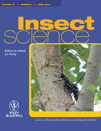
Insect Science
Fostering interdisciplinary dialogue in the world of insects.Insect Science, published by WILEY, stands as a prestigious journal in the realms of Agronomy, Biochemistry, Genetics, and Insect Ecology. The journal, with ISSN 1672-9609 and E-ISSN 1744-7917, has firmly established itself as a significant resource for researchers and professionals seeking to explore the intricate dynamics of insects and their crucial roles in ecosystems. With a remarkable impact factor placing it in the Q1 quartile across multiple categories, including Ecology and Evolution and Agronomy and Crop Science, Insect Science ranks impressively at #8 out of 181 in the realm of Insect Science on Scopus, showcasing its influence and relevance in the field. Spanning its coverage from 1994 to 2024, this journal invites contributions that advance our understanding of insect biology, behavior, and their interactions within agricultural contexts. The commitment to high-quality research and its role in fostering interdisciplinary dialogue make Insect Science an essential platform for scholars and practitioners at the forefront of insect-related studies.

PHOTOSYNTHETICA
Advancing plant science through innovative research.PHOTOSYNTHETICA is a prominent academic journal published by the Academy of Sciences of the Czech Republic, Institute of Experimental Botany, dedicated to advancing the field of plant science and physiology. Established in 1979, this open-access journal has been a vital platform for high-quality research and critical discussions within the scientific community, with its current impact factor reflecting its significance—ranking in the third quartile in Physiology and the second quartile in Plant Science as of 2023. With an impressive Scopus ranking (#96/516) in Plant Science and an 81st percentile standing, PHOTOSYNTHETICA showcases innovative research trends and methodologies vital for understanding photosynthetic processes and plant biology. The journal's open-access policy, initiated in 2019, ensures that valuable findings are readily available to researchers, professionals, and students globally, fostering collaboration and knowledge exchange. Set in the heart of Europe, this journal continues to be a cornerstone for experts dedicated to exploring the complexities of plant systems and their physiological responses.
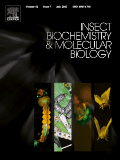
INSECT BIOCHEMISTRY AND MOLECULAR BIOLOGY
Unlocking the Mysteries of Insect BiochemistryINSECT BIOCHEMISTRY AND MOLECULAR BIOLOGY, published by Pergamon-Elsevier Science Ltd, stands at the forefront of interdisciplinary research focusing on the biochemical and molecular processes in insects. This esteemed journal, with an ISSN of 0965-1748 and E-ISSN of 1879-0240, serves as a vital resource for scientists and researchers interested in the intricacies of insect physiology and genetics. With a significant presence in the academic community, it holds impressive rankings, including Q2 in Biochemistry and Q1 in Insect Science according to the latest quartiles, reflecting its critical role in advancing knowledge in these fields. The journal's convergence of content from 1992 to 2024 illustrates its commitment to fostering long-term scholarly discourse. Researchers will appreciate its impact within the Agricultural and Biological Sciences and its contributions to understanding the molecular biology of insects. Although not an open-access journal, it provides complementary insights into the biochemistry and genetics of insects, making it indispensable for anyone keen on pushing the boundaries of entomological science.
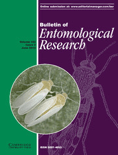
BULLETIN OF ENTOMOLOGICAL RESEARCH
Connecting Agriculture and Insect Science for Global ImpactBULLETIN OF ENTOMOLOGICAL RESEARCH, published by Cambridge University Press, is a prestigious journal that has been at the forefront of entomological research since its inception in 1910. With an impressive track record extending through to 2024, this journal serves as a vital platform for advancing knowledge in various related fields, notably Agronomy and Crop Science and Insect Science, where it ranks in the top quartile (Q2) and maintains a commendable position within the Scopus rankings in its categories. Notably, its contributions also intersect with Medicine in a broader scope, fostering interdisciplinary insights. While access to the journal content is not classified as 'Open Access,' its rigorous peer-reviewed articles are crucial for researchers, professionals, and students seeking to enhance their understanding of entomology and its applications in agronomy and beyond. The journal's impact is reflected in its notable percentile rankings, emphasizing its relevance and influence in the academic community. Located at the heart of the UK, the BULLETIN OF ENTOMOLOGICAL RESEARCH continues to be an essential resource for those dedicated to the study and understanding of insects and their impacts on agriculture and health.

REVISTA DE LA SOCIEDAD ENTOMOLOGICA ARGENTINA
Exploring the Wonders of Insect BiodiversityREVISTA DE LA SOCIEDAD ENTOMOLOGICA ARGENTINA is an esteemed open-access journal dedicated to the field of entomology, published by the SOCIEDAD ENTOMOLOGICA ARGENTINA. Since its transition to open access in 2013, the journal has sought to promote research in insect science, ecology, and related disciplines, facilitating global dissemination of knowledge and encouraging collaborative studies across borders. Located in the vibrant scientific landscape of La Plata, Argentina, the journal is indexed in Scopus and categorized in the fourth quartile of ecology and insect science, reflecting its commitment to enhancing the discourse within these critical fields. Aiming to bridge the gap between researchers, students, and professionals, REVISTA DE LA SOCIEDAD ENTOMOLOGICA ARGENTINA serves as a platform for innovative research, reviews, and reports on ecological interactions, behavior, and systematic entomology, ultimately driving forward our understanding of insect biodiversity and its broader environmental impacts.
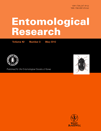
ENTOMOLOGICAL RESEARCH
Innovating Pest Management Strategies through ResearchENTOMOLOGICAL RESEARCH, published by Wiley, is a prominent journal within the field of Insect Science, with a significant focus on advancing our understanding of entomological studies, including pest management, biodiversity, and ecological impacts of insects. Since its inception in 2007, the journal has served as a vital platform for researchers and practitioners to publish high-quality, peer-reviewed articles that contribute to the growing body of knowledge in this essential discipline. With an H-index illustrating its citation impact and its classification in the 2023 Scopus quartile rankings at Q3, ENTOMOLOGICAL RESEARCH ranks 69 out of 181 journals in its field, positioning itself within the 62nd percentile, which underscores its relevance and contribution to agricultural and biological sciences. Although it does not offer Open Access, the journal remains committed to ensuring that its content reaches the widest possible audience, supporting ongoing discoveries and innovations in insect science. For researchers, professionals, and students seeking to remain at the forefront of entomological advancements, ENTOMOLOGICAL RESEARCH is an indispensable resource.
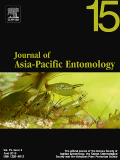
JOURNAL OF ASIA-PACIFIC ENTOMOLOGY
Pioneering Research for Ecological and Agricultural ImpactJOURNAL OF ASIA-PACIFIC ENTOMOLOGY, published by the Korean Society of Applied Entomology, is a distinguished platform that fosters the advancement of knowledge in the field of entomology, specifically tailored to the Asia-Pacific region. Since its inception in 1998, this journal has been instrumental in providing critical insights into the diverse aspects of insect science, reflecting its commitment to supporting both research and application in a variety of contexts, including agriculture and environmental sustainability. The journal is categorized in the Q3 quartile for Insect Science according to the 2023 rankings, and it holds a respectable Scopus rank of #62 out of 181 in its niche, situating it within the top 66th percentile of its field. With a focus on peer-reviewed research that emphasizes innovation and practical applications, the journal serves as an essential resource for researchers, professionals, and students seeking to deepen their understanding of entomological studies and their implications across ecological and agricultural landscapes.

Insects is a prominent open-access journal published by MDPI, dedicated to advancing research in the vibrant field of insect science. Since its inception in 2011, this journal has become a vital resource for academics and professionals alike, also ranked in the prestigious Q1 category within the Insect Science field by Scopus, achieving a remarkable rank of 26 out of 181 journals. With an ongoing convergence period from 2010 to 2024, Insects provides comprehensive coverage of various aspects of entomology, including but not limited to ecology, behavior, physiology, and applied entomology. Based in Switzerland, the journal promotes an open-access model, ensuring that vital research is readily available to researchers, practitioners, and students globally. This journal not only facilitates the dissemination of groundbreaking entomological research but also fosters collaboration and interdisciplinary dialogue in the field.

Physiological Reports
Advancing the Frontiers of PhysiologyPhysiological Reports is a pioneering open-access journal published by WILEY, dedicated to advancing the field of physiology through the dissemination of high-quality research. Since its inception in 2013, this journal has provided a platform for innovative studies in both general physiology and medical physiology, making significant contributions to our understanding of biological processes. With an impact factor that reflects its growing influence—as evidenced by its placement in the Q2 category for physiology and medical physiology in 2023—Physiological Reports is positioned as a vital resource for researchers and practitioners alike. The journal encourages the submission of diverse studies ranging from cellular mechanisms to systemic physiology, presenting a unique opportunity for authors to reach a global audience without access barriers. It has established a reputation for rigorous peer review and timely publication, ensuring that cutting-edge research is readily available to stimulate further inquiry and collaboration in the scientific community.